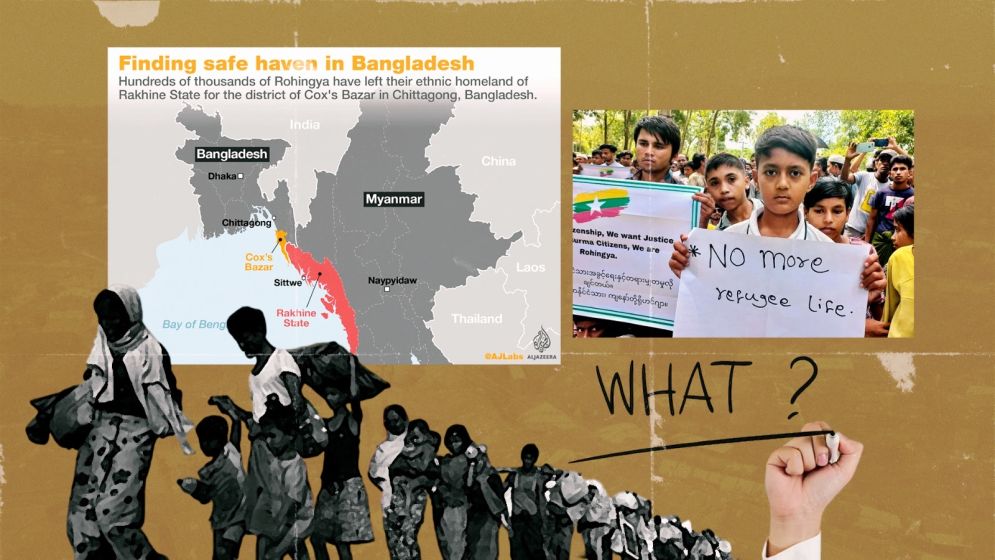We need to question Bangladesh’s intelligence failure in the Rohingya crisis

In the world of national security, there are moments that redefine the limits of failure. For the Bangladeshi military and intelligence establishment, that moment arrived in August 2017.
Whether they admit it or not, it was their "twin towers"-- a catastrophic intelligence lapse as hundreds of thousands of Rohingya refugees surged across the border into Cox’s Bazar, fleeing one of the most chilling campaigns of ethnic cleansing in this century.
By then, it was already too late.
For months, signs of what was coming had been flashing red. International media were reporting military build-ups in Myanmar’s Rakhine state, arbitrary arrests, enforced disappearances–the unmistakable harbingers of a brutal state crackdown.
Yet in Dhaka, particularly among the security elite, there was only silence. Deafening, deliberate silence.
As a senior staffer at a leading national newspaper during that time, I can attest firsthand: there were no quiet warnings from the intelligence community. No background briefings.
Not a whisper from the Inter-Services Public Relations Directorate (ISPR). The intelligence arms of the state– who miss no detail of a student protest in Dhaka– failed to register, or at least failed to report, the impending catastrophe unfolding just miles from our southern border.
This wasn’t a bolt from the blue. Military operations like the one launched by Myanmar’s Tatmadaw in 2017 are not spontaneous. They require methodical planning–troop movements, logistics, intelligence blackouts, and above all, a constructed pretext.
That pretext came in late August, when ARSA militants attacked border posts. But the machinery of violence had already been primed. The match was struck–but the pyre had been stacked long before.
So the question looms: how did Bangladesh’s formidable intelligence network– with its eyes and ears inside embassies, along borders, inside refugee camps, even embedded across the Rakhine frontier–miss it?

Institutional failure…or what?
To believe they were entirely unaware is to entertain the idea of gross institutional failure. More likely, the alarms were raised– and buried.
Our embassy in Yangon includes a defense attaché whose explicit role is to monitor military developments. Over the years, Dhaka has developed deep, if discreet, intelligence networks in Myanmar's troubled western regions.
It strains credulity to think that no warnings filtered through those channels.
So what happened to those reports? Were they diluted by bureaucracy? Dismissed by the Armed Forces Division? Or were they seen — and shelved — by higher authorities who preferred to look away?
We may never get an honest accounting. But what cannot be denied is this: in 2017, as a humanitarian disaster surged over our borders, the agencies tasked with foreseeing threats failed. And whether by incompetence or design, Bangladesh was left blindsided by a tragedy it should have seen coming.
When hundreds of thousands of Rohingya refugees flooded into Bangladesh in late 2017, the humanitarian crisis exposed more than the brutality of Myanmar’s military regime.
It laid bare the stunning failure of Bangladesh’s own intelligence apparatus– a failure that continues to haunt us, not just as a national security lapse, but as a symptom of a deeper institutional rot.
One uncomfortable but increasingly plausible explanation is this: our intelligence services weren’t looking outward– they were looking inward.
By 2017, key branches of Bangladesh’s intelligence community had become less focused on external threats and more entrenched in domestic repression.
Enforced disappearances, mass surveillance, warrantless detentions, and the quiet expansion of secret detention sites had become routine features of our internal security landscape.
Intelligence, once intended to secure the state, had been refashioned into a tool of political control.
This was no secret. Public remarks by retired high-ranking military officers in recent years have only confirmed what many already suspected: the intelligence community had shifted its gaze away from the borderlands and toward the citizens it was meant to protect.
In that context, is it any surprise they failed to register– or respond to– the slow, deliberate build-up to one of the most aggressive ethnic cleansing campaigns of our time, unfolding just across the Naf River?

Myanmar’s opportune moment
Myanmar’s generals understood this distraction well. In the chaos of regional inattention, they forced a long-persecuted population into Bangladesh’s already fragile socio-political fabric. And our security institutions were caught flat-footed.
The consequences are still unfolding. Nearly a million refugees have strained our infrastructure, tested our patience, and frayed the social fabric in host communities.
The crisis has burdened our exchequer and complicated our foreign policy, locking us in a diplomatic quagmire with a neighbor determined to dodge accountability.
Meanwhile, transnational criminal networks–from meth traffickers to human smugglers–have found fertile ground in the disorder of overcrowded refugee camps and porous borders.
All of this might have been mitigated if Bangladesh’s intelligence community had functioned as it was meant to.
If early warnings had been acted upon, if strategic containment plans had been drafted, if preparations had been made, the burden on the country–humanitarian, economic, and security– would have been far lighter.
In any functioning democracy, an intelligence failure of this magnitude would have triggered immediate review. After the 9/11 attacks, the United States established a bipartisan commission that dissected the failures of its security infrastructure– not just to assign blame, but to ensure the system could never be caught so unprepared again.
Bangladesh deserves no less.
For too long, our intelligence agencies have operated behind an opaque curtain, shielded from public scrutiny and beyond the reach of civilian oversight.
That may once have been seen as necessary in the name of national security. But when secrecy enables blindness–and that blindness enables catastrophe– accountability is no longer a threat to national security. It is a prerequisite for it.
Now, in 2025, with the worst excesses of the Digital Security Act behind us, we have an opening–perhaps our only one– to ask hard questions. We must take it.
A civilian-military joint inquiry task force should be established to investigate how this intelligence failure occurred, and why. Its findings must be public.
Not to humiliate our defense institutions, but to strengthen them. Not to sow division, but to build a culture of readiness and responsibility.
Bangladesh cannot afford another blind spot of this scale. We have paid the price once. We may not survive it again.
—-
Adil Mahmood is a former journalist

